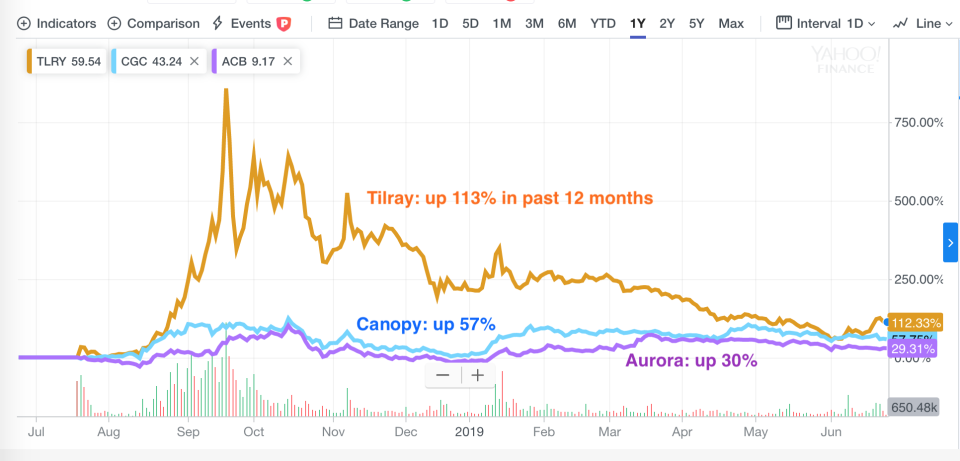What cannabis and fake meat have in common right now
There are obvious similarities right now between the explosion of cannabis companies and the fervor around plant-based meat products: rapid M&A activity; overhyped product launches; and soaring stocks that are giving massive valuations to companies that still have very small revenue.
Tilray (TLRY), at its peak price last September, had a market cap of $15 billion, after posting $43 million in sales in 2018. Beyond Meat (BYND) is trading at a multiple 45 times its sales, with an $8.7 billion market cap on 2018 revenue of just $88 million.
The biggest question for both of these markets right now is: How big can they get?
The answer is all about TAM, or total addressable market. It’s the big impressive number that tech startups are throwing at venture capitalists these days to convince them to invest. A company’s current revenue is less relevant for investors than its potential revenue growth and potential customer base.
In North America, recreational marijuana is still only legal in 11 states and Canada; critics of these high-flying pot stocks see that as an obvious limiting factor, while bulls frame it positively as “long runway” to grow.
Beyond Meat is the only publicly traded “pure play” in the fake meat craze, which may help explain why it’s up 500% since its IPO. But its debut has prompted a parade of larger food companies, from Whole Foods to McDonalds to Tyson, striking deals to jump into the fake meat business—or at least stating their intention to jump in.
Practically every day now, a big food company announces a plant-based burger launch, or a celebrity or pro athlete promotes a new CBD endorsement.
The problem is that many TAM projections look wildly overinflated.

Is the market really that big?
Beyond Meat CEO Ethan Brown, speaking to Yahoo Finance on May 2 just minutes after his company went public, casually said that his company is tackling a “$1.4 trillion market that has seen very little disruptive innovation recently, or throughout history really.”
That is a gargantuan number: $1.4 trillion. Where does it come from? It is the widely-cited figure for the entire global meat industry. So for Brown to frame his company’s TAM in that context is a bit of a stretch: it supposes that Beyond Meat could convert everyone in the world who eats meat to eating plant-based alternatives. But it’s a nice giant TAM number to throw around. (Another important acronym for Beyond Meat, in its effort to convert carnivores to plant-based protein, is CAC: customer acquisition cost.)
In the cannabis business, you see similarly eye-popping numbers. DataTrek, using two “relatively mature” marijuana markets (Colorado and Washington) to extrapolate estimates, determined this month that the cannabis industry’s TAM in the U.S. is $50 billion in projected annual sales. That would be very large for an industry that saw $5.8 billion in sales last year of legal recreational marijuana and $4.6 billion in legal medical marijuana.

A new report from Arcview Market Research is a little bit more conservative. Arcview projects the legal cannabis industry to reach $40.6 billion by 2024. That would still represent a tripling of sales in just five years, and it presumes rapid legalization on a state-by-state basis, which is a significant leap.
Clearly the legal cannabis industry, and the plant-based protein trend, are growing rapidly and seeing enormous investment. They are both real businesses, around real products that are in demand. And all that investment rests on big faith in future growth, based on big sales projections.
But investors in these two industries ought to pay attention to what happened in the esports explosion, where growth projections were vastly overinflated and the rose-colored glasses eventually came off.
—
Daniel Roberts is a senior writer and show host at Yahoo Finance. Follow him on Twitter at @readDanwrite.
Read more:
Why pro athletes are flocking to CBD, from Lamar Odom to Bubba Watson
Beyond Meat CEO after IPO: 'I'm not going to look every day at the stock price'
Uber has lived through a parade of executive exits before its IPO
Read the latest financial and business news from Yahoo Finance
Follow Yahoo Finance on Twitter, Facebook, Instagram, Flipboard, LinkedIn, YouTube, and reddit.
